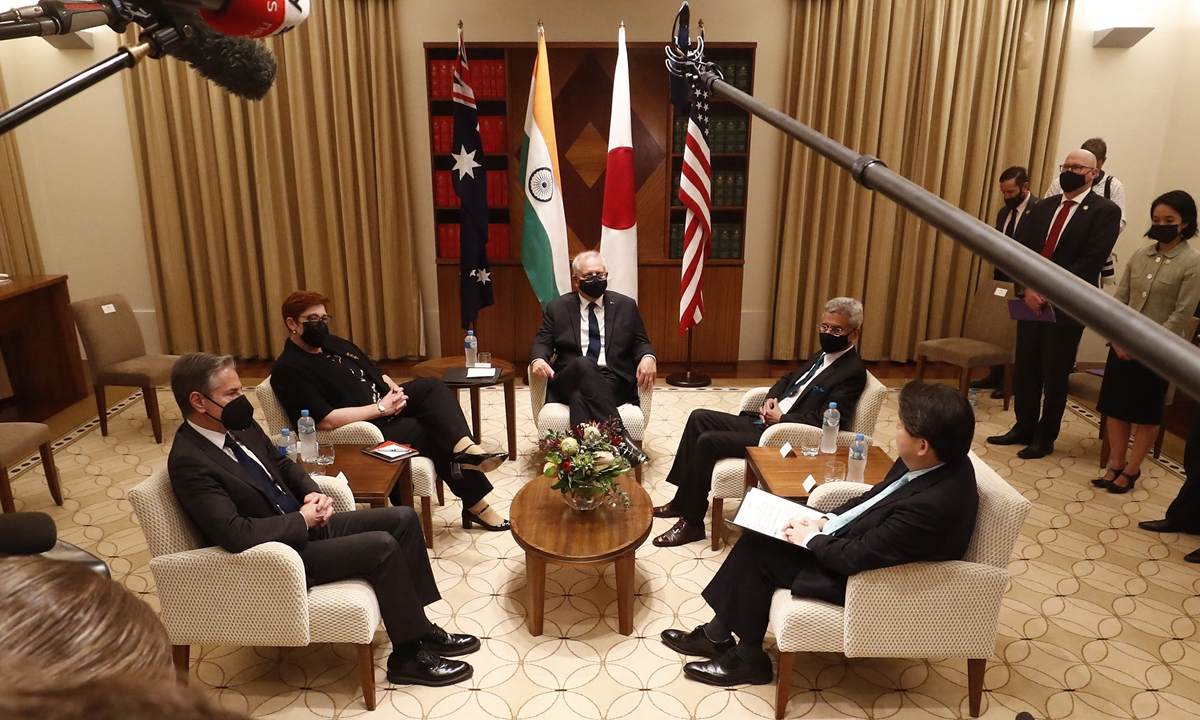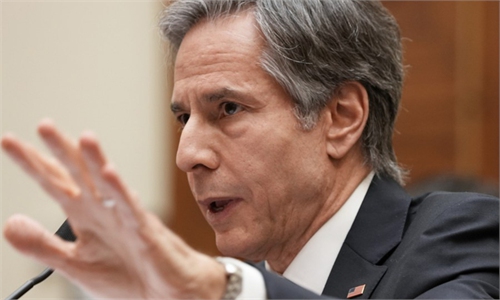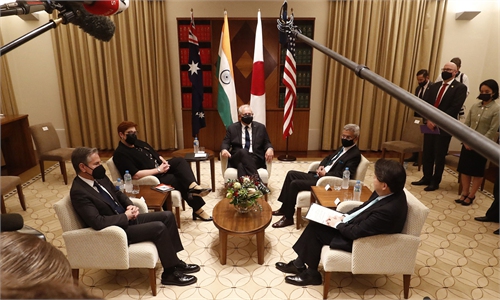US steps up moves to woo Pacific island countries after releasing Indo-Pacific strategy

Australian Prime Minister Scott Morrison (center) addresses US Secretary of State Antony Blinken (left), Australian Foreign Minister Marise Payne (2nd from left), Indian External Affairs Minister Subrahmanyam Jaishankar (2nd from right) and Japan's Foreign Minister Yoshimasa Hayashi (right) before a Quad meeting in Melbourne on February 11, 2022. Photo: AFP
In order to match up with release of its long-awaited Indo-Pacific strategy on Friday, the Biden administration has hastened steps to enhancing its footprint in the region, by announcing to reopen an embassy in the South Pacific nation of the Solomon Islands, and arranging a lightning visit to Fiji by its Secretary of State.
Experts said the US' "sudden and cordial" move to woo Pacific islands nations demonstrates its anxiety over China's deepened relationship with those countries.
While being bogged down in the Ukraine situation, the US is still attempting to marshal Indo-Pacific countries and signaling that this region still tops Biden administration's diplomatic list of priorities, by sending US Secretary of State Antony Blinken to tour the region, and releasing the Indo-Pacific strategy calling for preventing China from "transforming the region into its own sphere of influence."
Yet experts pointed out many flaws of the US plan, which includes Washington's overestimation of its ability to handle the "two-front confrontations" with both China and Russia; the regional nations' reluctance to be dragged into a "us-or-them" situation between the US and China. They believe the US Indo-Pacific goal is too big that it is basically a "fantasy" for Washington to achieve.
The US plans to reopen its embassy in the Solomon Islands, US Secretary of State Blinken announced Saturday in nearby Fiji during a virtual meeting with 18 Pacific Island leaders.
During the virtual meeting, Blinken underscored Washington's focus on the region. The top US diplomat said the embassy on the Solomon Islands is being reestablished to help the US counter Chinese influence in the politically unstable country.
In response, a spokesperson from the Chinese embassy in Solomon Islands said on Sunday that the cooperation between China and the Pacific island country has brought substantial benefit to people from both countries. The bilateral relation is established under the basis of equal, mutual respect and benefit; and is not targeted at any third party.
China upholds the notion of a community with a shared future for mankind, and the Pacific island nation promotes the idea of "making more friends, making no enemies," said the spokesperson, urging other countries to meet such notions half way, discard zero sum mentality and contribute more to development and stability of Pacific countries.
In Fiji, where the top US diplomat visited on Saturday, Blinken said the US was ready to spend more money to support the Pacific Islands. It marks the first time in 37 years a US Secretary of State had visited Fiji.
The South Pacific became the first region the US tried to pander to after Biden administration issued the long-awaited Indo-Pacific Strategy shows the region has become the next important strategic arena for the US to compete with China, Chen Hong, a professor and director of the Australian Studies Centre, East China Normal University, told the Global Times. He explained that the US is deeply anxious about China's growing ties with the regional countries through the Belt and Road Initiative, investment projects, and building roads and ports.
But these island countries are crystal clear about the US' true agenda, said Chen, noting that they are reluctant to be served as instrument of big power struggles; and are fully aware China can bring them substantial benefit. "So those Pacific island countries will disappoint Washington."
Too big a goal
Experts agreed Blinken's ongoing Asia trip since last week, and the newly released strategy show that the US still prioritizes sustained engagement with the region, even as it faces the more acute Ukraine issue.
It also comes after China and Russia declared earlier this month a "no limits" strategic partnership, their detailed and assertive statement to work together, and joint objection of any extraterritorial attempts to sabotage the common surrounding areas of the two countries.
The 12-page strategy overview, released by the White House on Friday, vowed to focus on "every corner of the region from South Asia to the Pacific Islands" to strengthen commitment to pursue a "free and open Indo-Pacific" through building stronger alliance, strengthening emerging partnerships and investing more in the region.
Rather than repeatedly mentioning "China" and "democracy," this new overview in a crafty way overstates "partnership" and "alliance" in an attempt to tout for support and understanding from the American public, its allies and media, experts said. "Although the overview seems more like a practical and detailed action plan than that of the previous Trump administration, it is calling for closer US integration with other players, requiring Asian countries to cut off ties and for decoupling the current cross-national frameworks with China. But is it possible?" Xin Qiang, deputy director of the Center for American Studies at Fudan University, told the Global Times。
Lü Xiang, a research fellow at the Chinese Academy of Social Sciences saw the strategy as a "ridiculous conclusion of the US on dealing with so-called 'Indo-Pacific' affairs" in an attempt to join hands with a wide range of Asian countries who are reluctant to do so, except Australia.
Blinken met foreign ministers from Quad, a security group among the US, Japan, India and Australia on Friday. Indian Foreign Minister Subrahmanyam Jaishankar said on Friday that the Quad had a positive agenda. He said the Quad stood "for something, not against somebody".
Biden administration's Indo-Pacific Strategy also singled India out, by stressing the importance of "a strong India" as a partner in a positive regional vision.
Lü stated that India has always been seen by Washington as "weak link" in the Quad, and the US Indo-Pacific Strategy as the former clings to its diplomatic autonomy and distances itself from, or even has discrepancies with the US on certain issues, such as climate change.
He said that stressing India doesn't mean the US will endorse great benefit for India, or attach special attention to the country; but just signals the importance of India in its regional strategy.
On the flashpoint of Taiwan question, which is purely China's domestic affairs, the strategy claimed "Washington would work with partners inside and outside the region to maintain peace and stability in the strait dividing the island from China."
Hyping the Taiwan question as a regional question mirrored the US realization of its inability to interfere with this question politically and militarily, and the wording won't push itself into a perilous situation, said the expert.
Experts believed that the strategy, which desperately urged reluctant countries to act together to counter China, is not only a waste of its already shrinking diplomatic resources, but also reflected the US' "powerlessness" in competing with China on its own. "In the end, Washington will realize its Indo-Pacific strategy is too big to be realized by such a declining power, basically a fantasy," said Lü.



